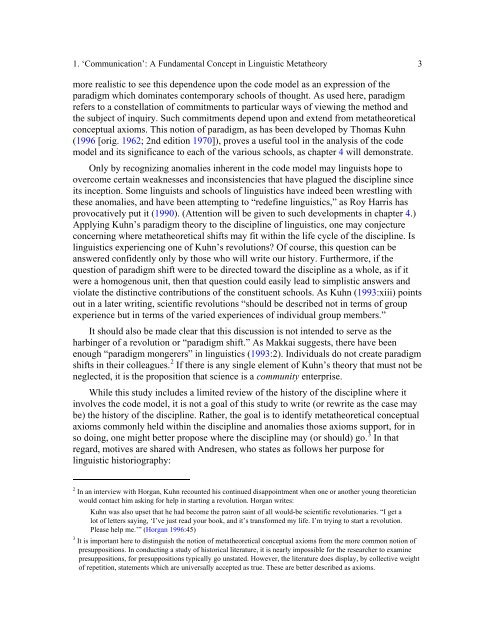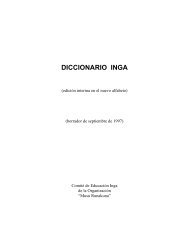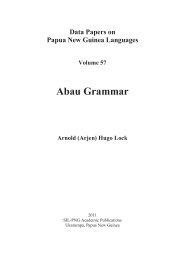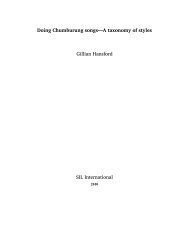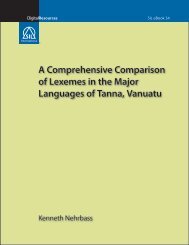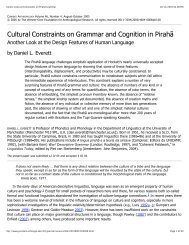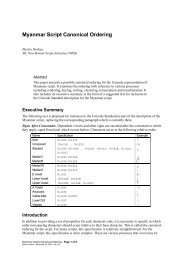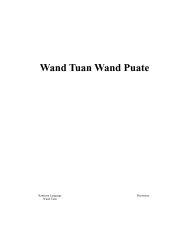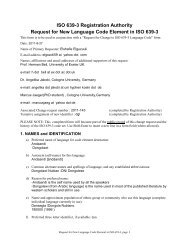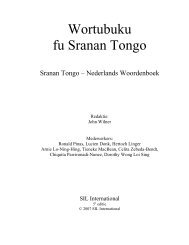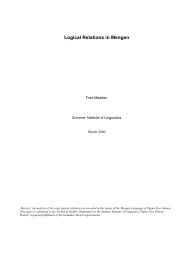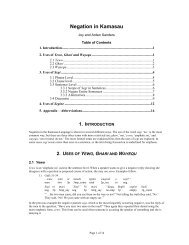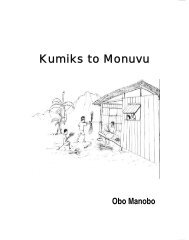The code model of communication: a powerful - SIL International
The code model of communication: a powerful - SIL International
The code model of communication: a powerful - SIL International
Create successful ePaper yourself
Turn your PDF publications into a flip-book with our unique Google optimized e-Paper software.
1. ‘Communication’: A Fundamental Concept in Linguistic Metatheory 3<br />
more realistic to see this dependence upon the <strong>code</strong> <strong>model</strong> as an expression <strong>of</strong> the<br />
paradigm which dominates contemporary schools <strong>of</strong> thought. As used here, paradigm<br />
refers to a constellation <strong>of</strong> commitments to particular ways <strong>of</strong> viewing the method and<br />
the subject <strong>of</strong> inquiry. Such commitments depend upon and extend from metatheoretical<br />
conceptual axioms. This notion <strong>of</strong> paradigm, as has been developed by Thomas Kuhn<br />
(1996 [orig. 1962; 2nd edition 1970]), proves a useful tool in the analysis <strong>of</strong> the <strong>code</strong><br />
<strong>model</strong> and its significance to each <strong>of</strong> the various schools, as chapter 4 will demonstrate.<br />
Only by recognizing anomalies inherent in the <strong>code</strong> <strong>model</strong> may linguists hope to<br />
overcome certain weaknesses and inconsistencies that have plagued the discipline since<br />
its inception. Some linguists and schools <strong>of</strong> linguistics have indeed been wrestling with<br />
these anomalies, and have been attempting to “redefine linguistics,” as Roy Harris has<br />
provocatively put it (1990). (Attention will be given to such developments in chapter 4.)<br />
Applying Kuhn’s paradigm theory to the discipline <strong>of</strong> linguistics, one may conjecture<br />
concerning where metatheoretical shifts may fit within the life cycle <strong>of</strong> the discipline. Is<br />
linguistics experiencing one <strong>of</strong> Kuhn’s revolutions? Of course, this question can be<br />
answered confidently only by those who will write our history. Furthermore, if the<br />
question <strong>of</strong> paradigm shift were to be directed toward the discipline as a whole, as if it<br />
were a homogenous unit, then that question could easily lead to simplistic answers and<br />
violate the distinctive contributions <strong>of</strong> the constituent schools. As Kuhn (1993:xiii) points<br />
out in a later writing, scientific revolutions “should be described not in terms <strong>of</strong> group<br />
experience but in terms <strong>of</strong> the varied experiences <strong>of</strong> individual group members.”<br />
It should also be made clear that this discussion is not intended to serve as the<br />
harbinger <strong>of</strong> a revolution or “paradigm shift.” As Makkai suggests, there have been<br />
enough “paradigm mongerers” in linguistics (1993:2). Individuals do not create paradigm<br />
shifts in their colleagues. 2 If there is any single element <strong>of</strong> Kuhn’s theory that must not be<br />
neglected, it is the proposition that science is a community enterprise.<br />
While this study includes a limited review <strong>of</strong> the history <strong>of</strong> the discipline where it<br />
involves the <strong>code</strong> <strong>model</strong>, it is not a goal <strong>of</strong> this study to write (or rewrite as the case may<br />
be) the history <strong>of</strong> the discipline. Rather, the goal is to identify metatheoretical conceptual<br />
axioms commonly held within the discipline and anomalies those axioms support, for in<br />
so doing, one might better propose where the discipline may (or should) go. 3 In that<br />
regard, motives are shared with Andresen, who states as follows her purpose for<br />
linguistic historiography:<br />
2<br />
In an interview with Horgan, Kuhn recounted his continued disappointment when one or another young theoretician<br />
would contact him asking for help in starting a revolution. Horgan writes:<br />
Kuhn was also upset that he had become the patron saint <strong>of</strong> all would-be scientific revolutionaries. “I get a<br />
lot <strong>of</strong> letters saying, ‘I’ve just read your book, and it’s transformed my life. I’m trying to start a revolution.<br />
Please help me.’” (Horgan 1996:45)<br />
3<br />
It is important here to distinguish the notion <strong>of</strong> metatheoretical conceptual axioms from the more common notion <strong>of</strong><br />
presuppositions. In conducting a study <strong>of</strong> historical literature, it is nearly impossible for the researcher to examine<br />
presuppositions, for presuppositions typically go unstated. However, the literature does display, by collective weight<br />
<strong>of</strong> repetition, statements which are universally accepted as true. <strong>The</strong>se are better described as axioms.


